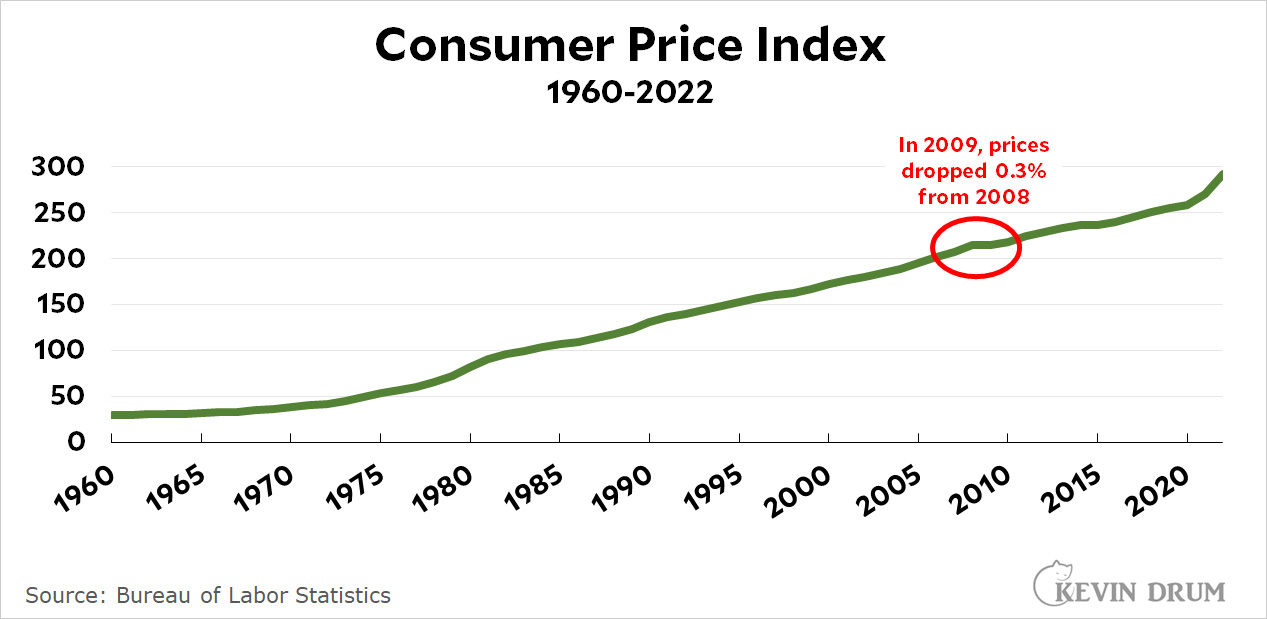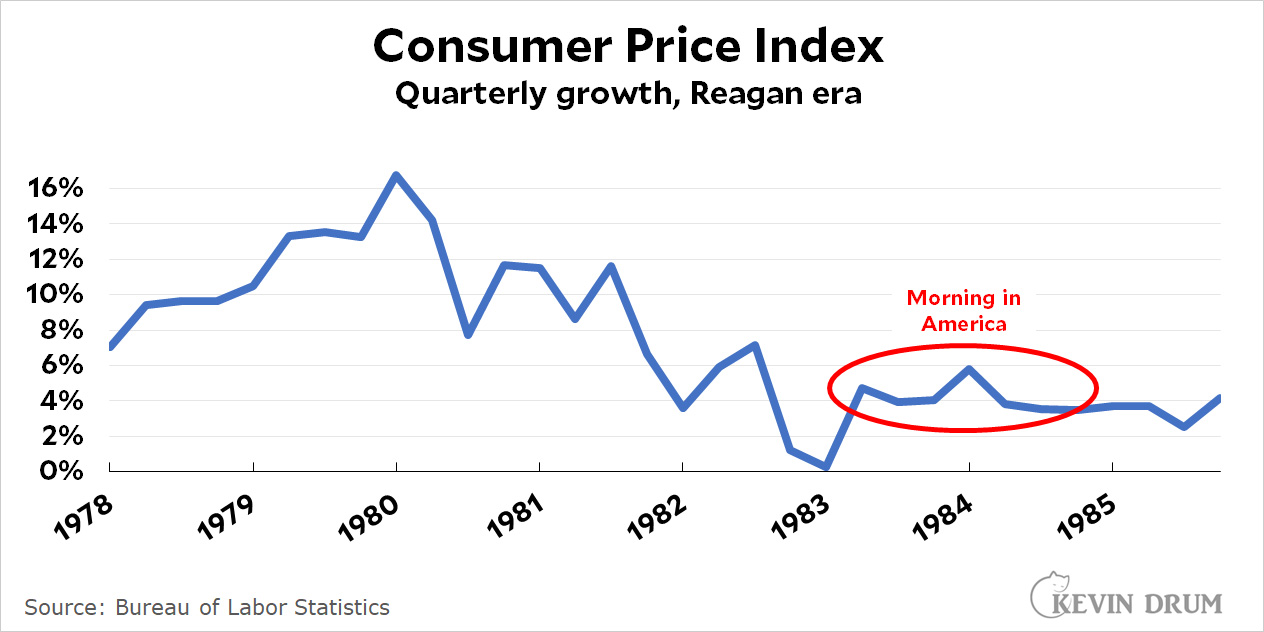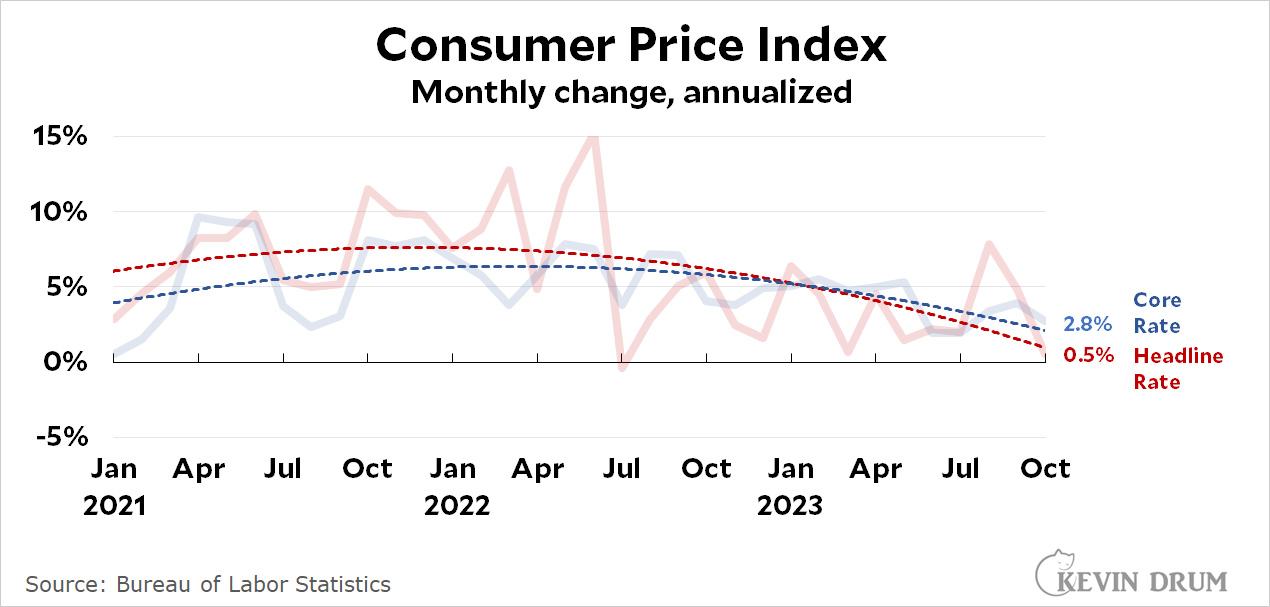Adjusted for inflation, retail sales were down 2.5% in October:
PPI eases substantially in October
The Producer Price Index dropped substantially in October:
 This is good inflation news. It's a volatile series, but on a trend basis PPI is down to 0%. Even the PPI for services was down to 0%.
This is good inflation news. It's a volatile series, but on a trend basis PPI is down to 0%. Even the PPI for services was down to 0%.
On a conventional year-over-year basis, PPI in October clocked in at 1.3%.
It’s not the inflation, it’s the prices?
The latest hotness about the economy is that people aren't satisfied with low inflation. They don't merely want prices to rise more slowly, they want prices to return to their old levels.
I don't know if this is true, or even whether it's an effective attack line. Either way, it ain't gonna happen. In the past 60 years, prices have declined exactly once, and even then only slightly:
 But I'm curious about whether this new attack is true. Are people really upset because prices went up and then stayed up? It's certainly possible, but here's a point of comparison:
But I'm curious about whether this new attack is true. Are people really upset because prices went up and then stayed up? It's certainly possible, but here's a point of comparison:
 Inflation was high during the first year of Reagan's presidency but then subsided thanks to Paul Volcker's recession. However, it rose again at the end of 1983. During the entire period of Reagan's 1984 reelection campaign it was above 4% and even spiked as high as 6%. Needless to say, this means prices continued to be high. They certainly never returned to their old level.
Inflation was high during the first year of Reagan's presidency but then subsided thanks to Paul Volcker's recession. However, it rose again at the end of 1983. During the entire period of Reagan's 1984 reelection campaign it was above 4% and even spiked as high as 6%. Needless to say, this means prices continued to be high. They certainly never returned to their old level.
Were people upset about this back then? Beats me, but "Morning in America" sure was successful and Reagan won reelection in a rout. It couldn't have bothered people all that much.
Today, we're coming off an inflationary peak quite a bit lower than Reagan's; the current inflation rate is lower than it was during 1984; the unemployment rate is lower; and real blue-collar wages are flat—just as they were during Reagan's first term. So why is there apparently so much more economic angst this time around?
Fox News is one reason. But I suspect there's another: it takes a while for people to adjust to economic news. Inflation went down nearly to zero in 1982 and 1983, and that gave people plenty of time to adapt to the idea that Reagan had defeated inflation. It went back up in 1984, but it wasn't until 1985 that people really noticed.
This time around, we've been in a high-inflation environment for the past two years, and people have adapted to that. Inflation is now coming down, but it will take another year before everyone responds. If Biden is lucky, by next summer people will have adapted to the idea that inflation is no longer a problem—but only if he's lucky.
Here’s why we hate each other
Andrew Gelman and pals have a new paper out that looks at one aspect of partisan polarization: perceptions of the opposite party vs. reality. What they found shouldn't surprise anyone. In a nutshell, Democrats think Republicans are more conservative than they really are, and Republicans think Democrats are more liberal than they really are. Here's a sampling:
 On access to birth control, for example, there's actually only a small difference between Ds and Rs (blue bar). However, the perception of difference is huge (beige bar).
On access to birth control, for example, there's actually only a small difference between Ds and Rs (blue bar). However, the perception of difference is huge (beige bar).
Most likely this is the fault of two things: (a) the media, and (b) thought leaders being more extreme than ordinary voters. If you watch Fox or MSNBC, all you see is the most extreme members of the opposite party, and those people tend to be politicians and professional pundits with militant views. Naturally you come away thinking that the opposite party is completely nuts.
This is the main factor behind the growth in affective polarization that I mentioned a few days ago. Half the population hates the opposite party compared to only a quarter before Newt Gingrich and Fox News came on the scene. Both Gingrich and Fox focused mostly on demonizing liberals, and eventually outlets like MSNBC started doing the same in the opposite direction. So now we're convinced that our opposites are entirely evil even though that's mostly true only among the fringiest of them. Our friends and neighbors are often not nearly as distant from our own views as we think.
Government shutdown avoided yet again
There won't be a government shutdown this month. Republicans supported Mike Johnson's continuing resolution only barely, 127-93, but Democrats joined up with the non-insane Republicans to give the CR a bipartisan 336-95 victory in the House. It's expected to pass the Senate later this week.
The CR lasts through late January, which means that at least a third of the budget year will go by with no cuts in spending.
Democrats sympathize more with Israel than with Palestinians
Here's the latest YouGov poll showing Democratic preferences in the Gaza war:
 Every age group is more sympathetic to the Israelis than the Palestinians with the exception of the youngest cohort, which is slightly more sympathetic to the Palestinians.
Every age group is more sympathetic to the Israelis than the Palestinians with the exception of the youngest cohort, which is slightly more sympathetic to the Palestinians.
Overall, Democrats approve of Joe Biden's handling of the war by 62-21%.
Lunchtime Photo
Raw data: Deaths in Gaza
Israel has (so far) killed about half a percent of the population of Gaza. This is the equivalent of 1.5 million killed in the United States—or roughly 25 Vietnams. Relative to Israel, it's nearly the equivalent of 40 October 7ths.
Republicans fail yet again to pass spending bills
Three weeks ago, Rep. Mike Johnson wrote a letter to his fellow Republicans saying that he was sure they could pass all 12 outstanding appropriations bills by.......this week. In the event, Republicans have passed zero appropriations bills.
The reason for this is the usual one: Hard-right members of the Freedom Caucus have stalled any progress unless they get the massive cuts they want. So now it's time to punt—again—and pass a continuing resolution to prevent a government shutdown. Unfortunately—well, take a guess:
On Tuesday, some of those same hard-line conservatives who moved to oust Mr. McCarthy vented their anger at Mr. Johnson. The House Freedom Caucus, a group of approximately three dozen hard-right lawmakers, announced that it would oppose the measure.
Johnson has now been backed into the same corner that got Kevin McCarthy fired: The only way to keep the government open is to pass a continuing resolution maintaining current spending levels with help from Democrats.
Once it's passed Republicans will have another couple of months to pass appropriations bills. Can they do it? Or will it be the same old story in January? Maybe this will be the first time ever that an entire year goes by without passing a budget—just a year's worth of continuing resolutions.
That would be something, wouldn't it? And it would be a huge own goal. After all, Democrats in the Senate have already agreed to spending cuts of about 7% that were agreed to in the debt ceiling negotiations. If the Freedom Caucus sticks to its guns, they'll end up instead with spending being maintained at current levels. That's a Democratic Party wet dream.
What a bunch of idiots.
Inflation slows significantly in October
CPI was down a lot in October:
 Headline inflation was down almost to zero thanks to lower gasoline prices, but core inflation was also down. On a trend basis, we're already down to the Fed's target rate.
Headline inflation was down almost to zero thanks to lower gasoline prices, but core inflation was also down. On a trend basis, we're already down to the Fed's target rate.
On the conventional year-over-year basis, headline CPI was down to 3.2% and core CPI was down to 4.0%.


